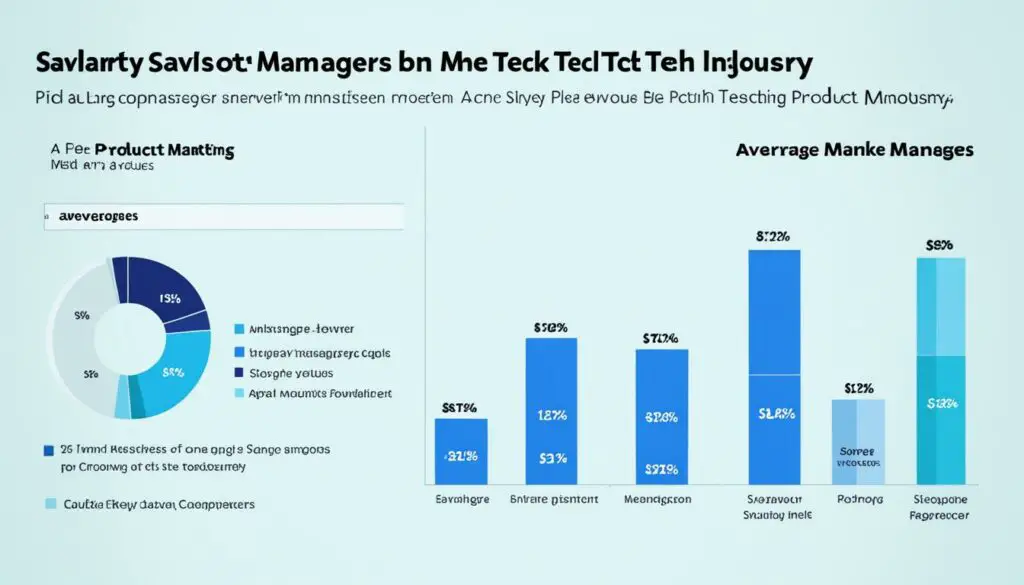Product management and product marketing are two distinct roles within a company, often confused with each other. While they share some similarities, they have different responsibilities and focus areas. In this guide, we will explore the key distinctions between product managers and marketing managers, including their responsibilities, skills, career paths, and salaries.
Key Takeaways:
- Product managers and marketing managers have different but complementary roles within a company.
- Product managers focus on developing and strategizing a product, while marketing managers focus on promoting and positioning it.
- Product managers are responsible for defining the product vision, creating roadmaps, and collaborating with cross-functional teams.
- Marketing managers are responsible for developing marketing strategies, crafting product messaging, and driving customer engagement.
- Career paths and salaries vary for both roles, with product managers often earning higher salaries on average.
What is Product Marketing?
Product marketing plays a crucial role in promoting new products or services to customers. The product marketing manager is responsible for creating and executing effective marketing strategies, developing compelling product messaging, and identifying the target audience.
The goal of product marketing is to generate demand and drive adoption of the product by resonating with customers and compelling them to make a purchase. By understanding the needs and preferences of the target audience, product marketing managers can craft a marketing strategy that effectively communicates the value and benefits of the product.
Key Responsibilities of a Product Marketing Manager:
- Developing comprehensive marketing strategies to reach the target audience and maximize product sales.
- Identifying and understanding the needs, pain points, and motivations of the target audience.
- Creating persuasive product messaging that highlights the unique features and benefits of the product.
- Collaborating with cross-functional teams, such as product management, sales, and design, to ensure the successful execution of marketing initiatives.
- Conducting market research to gather insights on market trends, customer preferences, and competitive analysis.
- Planning and executing product launches to generate buzz and increase product visibility.
| Product Marketing Manager | Product Manager | |
|---|---|---|
| Responsibility | Promoting the product and driving demand through effective marketing strategies. | Overseeing the strategic planning and development of the product. |
| Focus | Creating product messaging and identifying the target audience. | Defining the product vision and ensuring it meets customer needs. |
| Skills | Strong marketing strategy, communication, and customer understanding skills. | Strategic thinking, market analysis, and collaboration skills. |
| Career Path | Senior product marketing manager, director of product marketing, chief marketing officer. | Senior product manager, product management executive, chief product officer. |
| Salary Range | $80,000 – $150,000 (depending on experience and location). | $90,000 – $160,000 (depending on experience and location). |
Product marketing managers are crucial in driving the success of a new product by effectively positioning it in the market, understanding customer needs, and creating compelling messaging. Their ability to identify the target audience and develop comprehensive marketing strategies sets the foundation for a successful product launch and market penetration.
What is Product Management?
Product management is a strategic role focused on the planning and development of a product. Product managers are responsible for overseeing the entire product lifecycle, from conception to launch. They collaborate with various teams to ensure the success of the product by defining the product vision, setting goals based on customer needs and market analysis, and guiding the engineering team to build solutions that address customer problems.
Product managers play a crucial role in understanding customer needs and conducting market analysis to inform the development of the product. By gathering customer insights, they can identify opportunities and translate them into actionable product roadmaps. Market analysis involves studying market trends, competitive landscape, and industry dynamics to make informed decisions about the product’s features and positioning.
Effective product management requires strong communication and collaboration skills, as product managers work with cross-functional teams including design, engineering, marketing, and sales. They act as the central point of contact, aligning different teams towards a common goal and facilitating effective communication throughout the product development process.
Product managers also play a vital role in ensuring that the product meets customer needs. They work closely with the engineering team to develop and prioritize features that solve customer problems and deliver value. By understanding customer needs, product managers create a roadmap that aligns with business goals and guides the development process.
Overall, product management is a multifaceted role that combines strategic thinking, customer insights, market analysis, and effective communication. The table below highlights the key responsibilities of a product manager:
| Key Responsibilities of a Product Manager |
|---|
| Defining the product vision and strategy |
| Identifying and prioritizing customer needs |
| Conducting market analysis and competitive research |
| Creating and managing the product roadmap |
| Collaborating with cross-functional teams |
| Guiding the development process |
| Monitoring product performance and iterating based on feedback |
By fulfilling these responsibilities, product managers ensure that the product meets customer needs, aligns with business goals, and achieves success in the market.
Key Responsibilities of a Product Marketing Manager.
Product marketing managers play a critical role in the success of a product by taking it from development to market. They have a wide range of responsibilities that contribute to the overall marketing strategy and successful product launches. Let’s explore some of the key responsibilities of a product marketing manager:
Developing Product Messaging
One of the primary responsibilities of a product marketing manager is developing product messaging that effectively communicates the value proposition to customers. They work closely with the product management team to understand the unique features and benefits of the product and translate them into compelling messaging. This messaging helps customers understand why the product is valuable and why they should choose it over competitors.
Creating Sales Enablement Materials
Product marketing managers are also responsible for creating sales enablement materials that support the sales team in effectively selling the product. These materials include product collateral, sales presentations, competitive analysis, and training materials. They work closely with the sales team to understand their needs and provide them with the necessary resources to effectively communicate the value of the product to potential customers.
Driving Successful Product Launches
Product marketing managers play a crucial role in driving successful product launches. They collaborate with cross-functional teams, such as design, engineering, sales, and customer success, to ensure a cohesive and impactful go-to-market strategy. They develop launch plans, coordinate marketing campaigns, and drive awareness and demand for the product. Their goal is to generate excitement and engagement around the product, resulting in a successful launch and adoption.
Overall, product marketing managers are responsible for effectively positioning the product in the market, creating compelling messaging, enabling the sales team, and driving successful product launches. Their collaboration with various teams and their expertise in marketing and product strategy make them a valuable asset in bringing products to market.
Key Responsibilities of a Product Manager.
A product manager plays a crucial role in the development and success of a product. They have a wide range of responsibilities that involve defining the product strategy, understanding customer needs through market analysis, and driving the development of solutions in collaboration with engineering teams. Let’s take a closer look at the key responsibilities of a product manager:
1. Defining the Product Strategy
A product manager is responsible for defining the overall strategy and vision for the product. This involves conducting market research and competitor analysis to identify market opportunities and determine the positioning of the product. By understanding customer needs and aligning them with business objectives, product managers develop a strategic plan to guide the product’s direction.
2. Creating a Product Roadmap
Product managers create a product roadmap that outlines the prioritized features and enhancements to be implemented over time. This roadmap serves as a strategic guide for the development team, ensuring that the product evolves in a way that meets customer needs and aligns with the business goals. It provides a clear vision of the product’s future and helps keep all stakeholders informed about the product’s roadmap.
3. Conducting Market Analysis
A product manager conducts market analysis to gain insights into customer needs, industry trends, and competitive landscapes. By analyzing market data, customer feedback, and industry reports, they gain a deep understanding of the target market and identify opportunities for product improvements or new product development. This analysis helps product managers make data-driven decisions and prioritize features and enhancements that will have the greatest impact on the product’s success.
4. Collaborating with Engineering Teams
Product managers work closely with engineering teams to bring the product to life. They collaborate with engineers, designers, and other stakeholders to transform the product strategy and roadmap into tangible features and solutions. By effectively communicating the product vision and requirements, product managers ensure that the development process stays on track and that the final product meets the intended goals and specifications.
5. Prioritizing Features and Enhancements
With input from various stakeholders and based on customer feedback, market analysis, and business objectives, product managers prioritize features and enhancements. They make informed decisions about what should be included in each product release, balancing resource constraints, customer needs, and market demand. This prioritization ensures that development efforts are focused on delivering the most value to customers and achieving the desired business outcomes.
Overall, a product manager plays a critical role in bridging the gap between customer needs and product development. By taking into account market analysis, customer feedback, and business objectives, they guide the strategic direction of the product and ensure that it meets the needs of the target market. The responsibilities of a product manager are diverse and require a combination of strategic thinking, market analysis, and effective collaboration with cross-functional teams.
Skills Required for Product Marketing Managers.
Product marketing managers play a critical role in driving the success of a product in the market. To excel in this role, they need to possess a range of skills that enable them to effectively understand the customer, conduct thorough market research, and communicate effectively. Let’s explore the essential skills for product marketing managers:
1. Customer Understanding
A deep understanding of the target audience is crucial for product marketing managers. This involves analyzing customer demographics, behaviors, and needs to ensure that the product messaging and marketing strategies resonate with the target market. By understanding the customers’ pain points, motivations, and preferences, product marketing managers can create compelling campaigns that drive customer engagement and ultimately lead to increased sales.
2. Market Research and Analysis
Product marketing managers need to be skilled in conducting comprehensive market research to gain insights into industry trends, competition, and customer preferences. By staying updated on market dynamics and consumer behavior, they can identify opportunities, assess market potential, and make informed decisions about product positioning and messaging. The ability to analyze market data and derive actionable insights is key to developing effective marketing strategies.
3. Communication and Storytelling
Excellent communication skills are vital for product marketing managers as they need to effectively convey the value proposition of the product to both internal and external stakeholders. They must be able to translate technical product details into customer-friendly messaging that is clear, concise, and compelling. Additionally, storytelling skills are crucial for creating impactful narratives that resonate with customers and differentiate the product from competitors.
4. Collaboration with Cross-Functional Teams
Product marketing managers work closely with various teams such as product management, sales, and design to ensure a coordinated and successful go-to-market strategy. Collaborative skills are essential for building and maintaining strong relationships with these teams, facilitating effective communication, and aligning everyone towards the common goal of driving product adoption and revenue growth.
By possessing a combination of these skills, product marketing managers can excel in their role and contribute to the success of the products they promote.
Skills Required for Product Managers.
Product managers play a critical role in driving the success of a product. To excel in this role, they must possess a diverse set of skills that encompass strategic thinking, market analysis, communication, collaboration, and decision-making. These skills enable product managers to effectively navigate the complexities of product development and ensure the product meets the needs of both customers and the business.
One of the key skills that product managers need is strategic thinking. They must have the ability to envision the long-term direction of the product and align it with the company’s overall goals and objectives. By analyzing market trends, customer needs, and competitive landscapes, product managers can develop a strategic roadmap that guides the product’s development and success.
Market analysis is another crucial skill for product managers. They need to thoroughly understand the target market, including customer preferences, behavior, and pain points. By conducting market research and analyzing data, product managers can gain valuable insights that inform product decisions and help identify opportunities for growth and differentiation.
Effective communication is essential for product managers to collaborate with cross-functional teams and stakeholders. They must be able to clearly articulate the product vision, goals, and requirements to engineers, designers, marketers, and executives. Product managers also need excellent listening skills to understand feedback from customers and internal teams, and effectively incorporate it into product development.
Product managers must excel in collaboration and relationship-building. They work closely with teams from different departments, such as engineering, design, marketing, and sales, to ensure all aspects of the product are aligned and coordinated. Strong collaboration skills enable product managers to effectively lead and inspire cross-functional teams, fostering a culture of innovation and success.
Lastly, product managers must possess exceptional decision-making skills. They often face conflicting priorities and need to make difficult choices based on customer needs, business objectives, and available resources. By prioritizing features, evaluating trade-offs, and making data-driven decisions, product managers can guide the product development process and ensure the delivery of a successful and impactful product.
Key Skills Required for Product Managers:
- Strategic thinking and planning
- Market analysis and research
- Effective communication and presentation
- Collaboration and team leadership
- Decision-making and prioritization
Career Paths and Salaries.
Both product managers and marketing managers have various career paths within their respective fields. Let’s explore the different career paths and salary ranges for these roles.
Product Manager Career Path
Product managers can progress through different levels in their career, gaining more responsibilities and leadership roles. Here is a typical product manager career path:
- Associate Product Manager
- Product Manager
- Senior Product Manager
- Group Product Manager
- Director of Product Management
- Chief Product Officer (CPO)
As product managers gain experience and demonstrate their abilities to drive successful product launches and strategic decision-making, they can climb the organizational ladder to executive positions such as Chief Product Officer.
Marketing Manager Career Path
Marketing managers also have various career paths available to them. Here is a typical marketing manager career path:
- Marketing Coordinator/Assistant
- Marketing Specialist
- Marketing Manager
- Senior Marketing Manager
- Director of Marketing
- Chief Marketing Officer (CMO)
Marketing managers can advance in their careers by gaining experience in different marketing roles, developing their strategic skills, and demonstrating their ability to drive successful marketing campaigns and initiatives. They can eventually reach executive positions such as Chief Marketing Officer.
Product Manager Salary
The salary of a product manager can vary based on factors such as experience, industry, location, and company size. According to data from Glassdoor, the average salary for a product manager in the United States is $108,992 per year.

Marketing Manager Salary
The salary of a marketing manager can also vary depending on similar factors. According to data from Glassdoor, the average salary for a marketing manager in the United States is $73,114 per year.
| Product Manager | Marketing Manager |
|---|---|
| $108,992 per year | $73,114 per year |
It’s important to note that these salary figures are just averages and can vary significantly depending on individual circumstances.
Conclusion.
Product managers and marketing managers are vital contributors to a company’s success, but they have distinct roles and responsibilities. Product managers are responsible for driving the development and strategy of a product, ensuring it meets the needs of the target market. On the other hand, marketing managers focus on positioning and promoting the product to customers, ultimately driving demand and adoption.
Both roles require a unique set of skills. Product managers need to possess strategic thinking, market analysis, and effective communication skills to guide the product’s direction. Marketing managers, on the other hand, must have a deep understanding of the target audience, excellent market research abilities, and strong storytelling skills to engage customers and drive conversions.
Understanding the differences between product management and product marketing can help professionals make informed decisions about their career paths in the marketing industry. Whether choosing to pursue a career as a product manager or marketing manager, individuals can expect various career progression opportunities and competitive salaries based on their experience, location, and company size. Ultimately, both roles are essential in bringing products to market successfully and maximizing their impact.
FAQ
What is the difference between a Product Manager and a Marketing Manager?
Product Managers are responsible for the strategic planning and development of a product, while Marketing Managers focus on promoting and positioning the product to customers.
What are the key responsibilities of a Product Marketing Manager?
Product Marketing Managers are in charge of developing product messaging, creating sales enablement materials, and driving successful product launches.
What are the key responsibilities of a Product Manager?
Product Managers are responsible for defining the product strategy, conducting market research, and collaborating with engineering teams to develop solutions.
What skills are required for a Product Marketing Manager?
Product Marketing Managers need a deep understanding of the target audience, market research abilities, and strong communication and collaboration skills.
What skills are required for a Product Manager?
Product Managers need strategic thinking, market analysis, strong communication and collaboration skills, and the ability to prioritize based on customer needs.
What career paths and salaries are available for Product Managers and Marketing Managers?
Product Managers can progress to senior product management roles or move into executive positions, while Marketing Managers can advance to senior marketing management roles. Salaries vary based on experience, location, and company size.
What is the conclusion of the Product Manager vs Marketing Manager comparison?
Product Managers and Marketing Managers have distinct roles and responsibilities, requiring a unique set of skills. Understanding these differences can help professionals make informed decisions about their career paths in the marketing industry.







